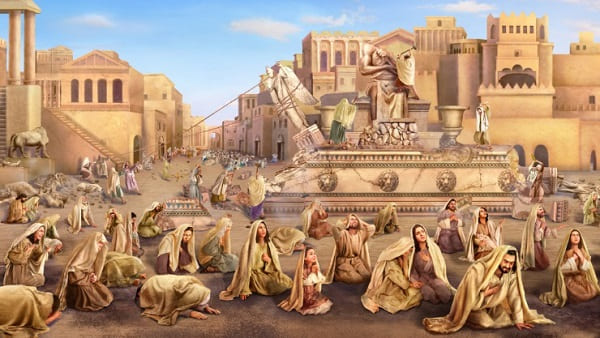Sometimes we shirk our responsibilities to God because of personal insecurities. We feel incapable, inferior, or ill equipped for the tasks. By contrast, a superiority complex might cause us to deviate from God’s will because we think that we know better than Him.
Our own laziness may be an obstacle to achieving anything meaningful for God. While the fear of failure may stop us dead in our tracks.
Can we really escape the presence of God?
Tracking devices have come a long way. We microchip our beloved cats and dogs, so that if they are stolen for their pedigree, or silly enough to run away, we can track them down and bring them back home.
When our precious mobile phones are accidentally misplaced, lost or stolen, they can often be located by accessing a tracking app if the sim card hasn’t been switched out.
Jonah the runaway
God’s message to Jonah was clear.
Arise, go to Nineveh, that great city, and cry against it; for their wickedness is come up before me. Jonah 1:2
Did Jonah really believe that he could flee from God? Yes, he did because his view of God and His presence was hazy. During this time in history, the overriding consensus amongst God’s people was that God was limited to the temple in Jerusalem, or at most confined to the land of Israel.
So, Jonah bolted. He fled to Tarshish, which was in the opposite direction of where God desired Jonah to preach.
Nineveh was the capital city of the Assyrian empire, populated by a vile and wicked people. They were Israel’s long-standing enemy.
The Assyrians were the cold, cruel terrorists of their day. They invented the brutal execution method of impaling their enemies on wooden spikes, leaving them to die slow agonising deaths.
You can run, but you can’t hide
Whether it was his own nationalistic prejudice, or believing that God should favour Israel above other nations, or the fear of losing his life by the hands of the Assyrians, we find Jonah’s avoidance tactic failing miserably.
Jonah didn’t need an RFID tracking device for God to find him, because God is omniscient and omnipresent. He knows where we are at all times. The Psalmist tells us that whether we are in heaven above or the earth below, He is there.
King David in Psalm 139:7-10 wrote
Whither shall I go from thy spirit? Or whither shall I flee from thy presence?
If I ascend up into heaven, thou art there: if I make my bed in hell, behold, thou art there.
If I take the wings of the morning, and dwell in the uttermost parts of the sea;
Even there shall thy hand lead me, and thy right hand shall hold me.

A string of miracles
But the LORD sent out a great wind into the sea, and there was a mighty tempest. . . Jonah 1:4a
This was no ordinary storm. It was extreme, and hurled out from the Lord’s own hands. Giant waves pummeled the ship and threatened to destroy it as the seasoned sailors trembled for their lives.
So they cast lots, and the lots fell upon Jonah. Jonah 1:7b
The sailors used the ancient practice of casting lots to determine which one of them had incited such divine anger. God controlled the outcome of this seemingly random selection.
And the sea ceased from her raging Jonah 1:15b
Jonah owned that it was his sin that caused the storm, and insisted on being thrown overboard. The men reluctantly did so, and tossed him into the raging waters. Upon impact, an eerie calm descended and the turbulent sea flattened into a sheet of darkness.
Now the LORD had prepared a great fish to swallow up Jonah. Jonah 1:17a
God appointed a great fish to swallow Jonah whole. He was powerless to escape from this peculiar grave—the digestive tract of an enormous sea creature.
And the LORD spake unto the fish, and it vomited out Jonah upon dry land. Jonah 2:10
While entombed in the slime and the intestinal juices of the great fish, Jonah pleaded with God to give him one more chance. God heard his desperate prayer and caused the great fish to regurgitate Jonah up on to the shore.
And the LORD God prepared a gourd, and made it to come up over Jonah Jonah 4:6
Jonah wandered around in the blazing heat and sat down to rest. God caused a shady plant to spring up and grow before his eyes.
But God prepared a worm . . . and it smote the gourd that it withered. Jonah 4:7
God sent a worm to attack the roots of the plant, so that by morning, the plant shriveled to nothing.
And it came to pass, when the sun did arise, that God prepared a vehement east wind: Jonah 4:8
God sent a scorching wind that came from the Arabian Desert. This was the eighth time that God displayed His control over nature.

God’s love for pagan nations
Though Nineveh was a city filled with evil and violence, God gave its people the opportunity to repent and be spared from His wrath.
Jonah was well aware of the gracious and merciful character of God.
And he prayed unto the LORD, and said, I pray thee, O LORD, was not this my saying, when I was yet in my country?
Therefore I fled before unto Tarshish: for I knew that thou art a gracious God, and merciful, slow to anger, and of great kindness, and repentest thee of the evil. Jonah 4:2
Here, it is revealed to us why Jonah ran from God’s commission. Jonah wanted the Ninevites erased from the earth, but he knew God would show mercy and not destroy them if they turned from their wickedness and sought the LORD for mercy.
Nineveh’s response to God’s message
The Ninevites worshipped the fish goddess Nanshe, and Dagon the fish god. Dagon’s upper body had a human head and hands, while his lower body was distinctly the tail end of a fish. This half man-half fish symbolized water and its natural powers.
Why would these idol-worshippers pay any attention to a foreign prophet?
Perhaps there were witnesses to the great fish vomiting Jonah onto dry land. They may have spread the news of Jonah’s miraculous survival before he entered into Nineveh. Being active worshippers of the fish god and goddess may also have caused them to be more receptive to Jonah’s message.
Besides this, Jonah skin was white from the acidic effects of being lodged inside the digestive tract of a large fish. This added credibility to his sensational experience.
Nineveh repents
Jonah tells the people of Nineveh that in 40 days their city would be overthrown. To Jonah’s surprise, these pagans actually believed God’s message.
They fasted. They prayed. They confessed their sins. From the humblest servant to their great king—everyone repented. They donned sackcloth and mourned. Even their animals were covered in sackcloth.
For their king commanded them to cry out to God, and to turn from their evil ways and their violence. Their wholesale repentance was sincere, because God turned his fierce anger away and spared the city.
And God saw their works, that they turned from their evil way; and God repented(relented) of the evil, that he said that he would do unto them; and he did it not. Jonah 3:10
God’s dealing with a reluctant messenger
God was concerned for the Ninevites, but he was also concerned about the messenger. Jonah still had much to learn about God. The Lord worked in him, as well as through him, despite Jonah’s personal flaws and ideas about how God should have dealt with the wicked.
God’s sovereignty was revealed many times over through events designed to confront and shape His messenger. These were lessons tailor made just for Jonah.
Let us be in awe of God who deals with us with such exquisite understanding.
Bibliography
Author unspecified. 2023. ‘Was Jonah truly swallowed by a whale?’ Got Questions.org. Retrieved 20 June 2023 from
https://www.gotquestions.org/Jonah-whale.html
The Archaeology Study Bible, 2017, Crossway, Wheaton, Illinois.
Henry, M. 1961, Commentary on the Whole Bible, Zondervan, Michigan.
Macarthur, J. 2019, The Macarthur Study Bible 2nd Edition, Thomas Nelson Publishers, China.
Pawson, D. 2015, Unlocking the Bible, William Collins, UK.
Pfeiffer C,F. 1990, The Wycliffe Bible Commentary, Moody Publishers, Illinois.
The Quest Study Bible, 1994, Zondervan Publishing House, Michigan.
Tucker, R. 2013, The Biographical Bible, Baker Books, Michigan.
Unger, M.F. 1988, The New Unger’s Bible Dictionary, Moody Press, Chicago.
Walton, J. 2000, The IVP Bible Background Commentary Old Testament, IVP Academic, Illinois.
Keener, C.1993, The IVP Bible Background Commentary New Testament, IVP Academic, Illinois.


